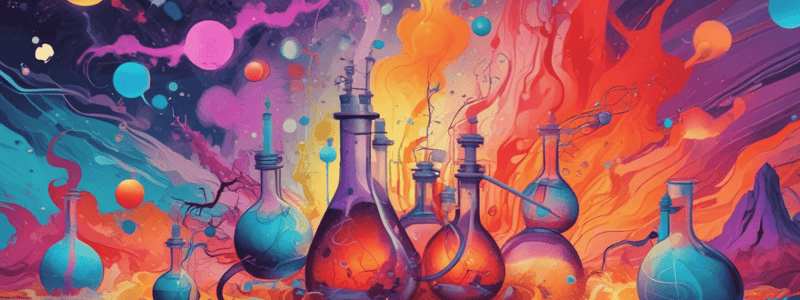Podcast
Questions and Answers
What is a characteristic of reversible reactions?
What is a characteristic of reversible reactions?
- They have a tendency to attain a state of equilibrium (correct)
- They always release heat energy
- They always involve strong acids and bases
- They can proceed to completion
What is an example of a reversible reaction?
What is an example of a reversible reaction?
- Neutralisation between strong acid and strong base
- Neutralisation between an acid and a base either of which or both are weak (correct)
- Thermal decomposition of PCl5
- Redox reaction between SnCl2 and FeCl3
What is the significance of the sign ⇌ in a reaction?
What is the significance of the sign ⇌ in a reaction?
- It represents the yield of the reaction
- It represents the reversibility of the reaction (correct)
- It represents the rate of the reaction
- It represents the irreversibility of the reaction
What is the characteristic of an irreversible reaction?
What is the characteristic of an irreversible reaction?
What is an example of an irreversible reaction?
What is an example of an irreversible reaction?
What is the effect of increasing temperature on the solubility of CaCl₂?
What is the effect of increasing temperature on the solubility of CaCl₂?
What is the effect of adding a catalyst on the equilibrium of a reaction?
What is the effect of adding a catalyst on the equilibrium of a reaction?
What is the condition for no change in equilibrium when the pressure of the system is changed?
What is the condition for no change in equilibrium when the pressure of the system is changed?
What is the effect of removing NH₃ on the equilibrium of the Haber's process?
What is the effect of removing NH₃ on the equilibrium of the Haber's process?
What is the effect of high pressure on the equilibrium of the formation of nitrogen dioxide?
What is the effect of high pressure on the equilibrium of the formation of nitrogen dioxide?
What is an irreversible reaction?
What is an irreversible reaction?
What is the key characteristic of a reversible reaction?
What is the key characteristic of a reversible reaction?
What happens to the concentration of reactants in a chemical reaction?
What happens to the concentration of reactants in a chemical reaction?
What is the characteristic of a reaction that occurs in a state of equilibrium?
What is the characteristic of a reaction that occurs in a state of equilibrium?
How are chemical reactions classified based on the extent to which they proceed?
How are chemical reactions classified based on the extent to which they proceed?
At equilibrium, what is the relationship between the rate of the forward reaction and the rate of the reverse reaction?
At equilibrium, what is the relationship between the rate of the forward reaction and the rate of the reverse reaction?
What is the effect of multiplying a chemical equation by a coefficient on the equilibrium constant?
What is the effect of multiplying a chemical equation by a coefficient on the equilibrium constant?
What is the relationship between Kp and Kc when Δn = 0?
What is the relationship between Kp and Kc when Δn = 0?
What is the unit of Kp when Δn ≠ 0?
What is the unit of Kp when Δn ≠ 0?
What is the characteristic of the equilibrium state in a closed vessel?
What is the characteristic of the equilibrium state in a closed vessel?
What is the primary difference between homogeneous and heterogeneous equilibrium reactions?
What is the primary difference between homogeneous and heterogeneous equilibrium reactions?
What is the significance of the concentration quotient (Q) in relation to the equilibrium constant (K)?
What is the significance of the concentration quotient (Q) in relation to the equilibrium constant (K)?
If Q > K, what will happen to the reaction?
If Q > K, what will happen to the reaction?
What is the relationship between Kp and Kc?
What is the relationship between Kp and Kc?
What are the units of the equilibrium constant Kc?
What are the units of the equilibrium constant Kc?
What is the relationship between the standard free energy change of a reaction and its equilibrium constant?
What is the relationship between the standard free energy change of a reaction and its equilibrium constant?
For a reaction aA + bB ⇌ cC + dD, what is the correct expression for the equilibrium constant K?
For a reaction aA + bB ⇌ cC + dD, what is the correct expression for the equilibrium constant K?
What is the unit of equilibrium constant Kc for a reaction aA + bB ⇌ cC + dD?
What is the unit of equilibrium constant Kc for a reaction aA + bB ⇌ cC + dD?
What is the relationship between the equilibrium constants Kp and Kc for a reaction aA + bB ⇌ cC + dD?
What is the relationship between the equilibrium constants Kp and Kc for a reaction aA + bB ⇌ cC + dD?
For a reaction at equilibrium, what is the condition for no change in equilibrium when the pressure of the system is changed?
For a reaction at equilibrium, what is the condition for no change in equilibrium when the pressure of the system is changed?




